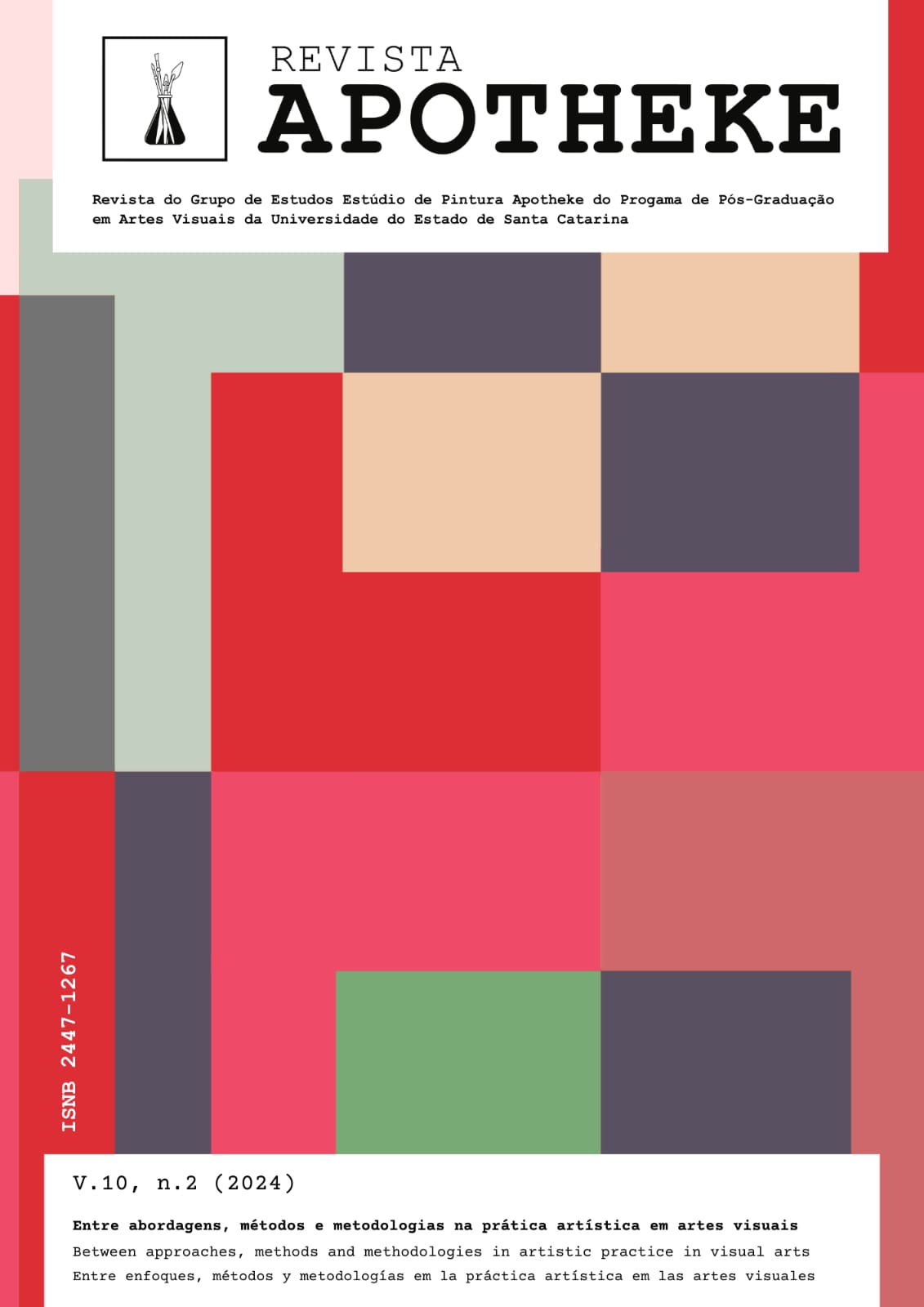AI Aesthetics: “Unreliable Memories” by Lev Manovich
DOI:
https://doi.org/10.5965/244712671022024156Keywords:
art and technology, generative art, artificial intelligence, Lev Manovich, synthetic memoryAbstract
This study focuses on the intersection between Artificial Intelligence (AI) and contemporary art. It centers on Lev Manovich’s exhibition Unreliable Memories as a case study, aiming to analyze how Manovich uses AI to expand the visual and conceptual boundaries of art, as well as the reliability of synthetic representations produced by these technologies. The document is divided into three main parts. It begins with a comprehensive theoretical contextualization on the aesthetics of AI and the challenges associated with artistic creation using image generation tools. Next, it analyzes the exhibition itself, describing the various series of works, from hand-drawn pieces of the 1980s to recent AI-generated creations – covering specific series such as Drawing Rooms and In the Garden – with visual peculiarities and imperfections that reflect the ephemeral and fragmented nature of memory. Finally, it discusses how the imperfections and peculiarities of AI-generated images reflect the fallibility of memory, challenging traditional perceptual norms. This research provides relevant insights into AI Aesthetics for the artistic and academic community, laying the groundwork for future academic and artistic investigations in the field.
Downloads
References
ARIELLI, Emanuele. Even an AI could do that. In: MANOVICH, Lev & ARIELLI, Emanuele. Artificial Aesthetics: A Critical Guide to AI, Media and Design. 2021.
ARIELLI, Emanuele. Human perception and the artificial gaze. In: L. MANOVICH, Lev & ARIELLI, Emanuele. Artificial Aesthetics: A Critical Guide to AI, Media and Design. 2024.
BELVEDERE MUSEUM. Lev Manovich | Das Kunstmuseum im digitalen Zeitalter – 2024. YouTube, 3 Mai. 2024. Disponível em: https://www.youtube.com/watch?v=CXR-B2URidw&t=256s. Acesso em: 18 jun. 2024.
DONNARUMMA, Marco. Against the norm: othering and otherness In AI aesthetics. Digital Culture & Society, v. 8. n. 2, p. 39-66. 2022.
FERREIRA, José Alberto. Memory machine. In: FERREIRA, José Alberto. Unreliable memories: Lev Manovich. Évora: Fundação Eugénio de Almeida, 2024. p. 7-21.
GRAHAM, Thomas. Art made by AI is selling for thousands – is it any good? BBC, 12 Dez. 2018. Disponível em: https://www.bbc.com/culture/article/20181210-art-made-by-ai-is-selling-for-thousands-is-it-any-good Acesso em: 18 jun. 2024.
MANOVICH, Lev. “In the Garden” series - ½. Some of the included images have 1:4 […]. [Atualização de status]. Facebook, 7 de Jul. 2023a. @lev.manovich. Disponível em: https://www.facebook.com/lev.manovich/posts/pfbid0WTrCc1DUhLm7tbh4Lmnr U9HieWJMYpsnCFoDvfw8e7FQzGh Nt7NHQXM4Q8mok2Jhl Acesso em: 18 jun. 2024.
MANOVICH, Lev. Separate and reassemble: Generative AI through the lens of art and media histories. In: MANOVICH, Lev & ARIELLI, Emanuele. Artificial aesthetics: A critical guide to AI, media and design. 2024a
MANOVICH, Lev. Seven arguments about AI images and generative media. In: MANOVICH, Lev & ARIELLI, Emanuele. Artificial aesthetics: A critical guide to AI, media and design. 2023b.
MANOVICH, Lev. In: FERREIRA, José Alberto (Ed.). Unreliable memories: Lev Manovich. Évora: Fundação Eugénio de Almeida. 2024b. p. 25-74, 99-133.
MIDJOURNEY. Community guidelines. Disponível em: https://docs.midjourney.com/docs/community-guidelines Acesso em: 18 jun. 2024.
MIDJOURNEY. Style. Disponível em: https://docs.midjourney.com/docs/style Acesso em: 18 jun. 2024.
RUSHDIE, Salman. Midnight’s children. Random House Trade Paperbacks. 2006 (Trabalho original publicado em 1981).
SHKLOVKY, Viktor. Art as technique. In Literary theory: An anthology. n. 3. p. 8-14. 1917.
WASIELEWSKI, Amanda. “Midjourney can’t count”: Questions of representation and meaning for text-to-image generators. The Interdisciplinary Journal of Image Sciences, v. 37. n. 1, p. 71-82. 2023.
ZYLINSKA, Joanna. Art in the age of artificial intelligence. Science, Washington, v. 381. n. 6654, p. 139-140. 2023.
ZYLINSKA, Joanna. Diffused seeing: The epistemological challenge of generative AI. Media Theory. v. 8. n. 1, p. 229-258. 2024.
Downloads
Published
How to Cite
Issue
Section
License
Copyright (c) 2024 Catarina Lira Pereira, Diana Costa, Domingos Loureiro

This work is licensed under a Creative Commons Attribution-NonCommercial 4.0 International License.
Copyright and Licensing Policy
Authors of works submitted to Revista APOTHEKE authorize their publication in both print and digital formats exclusively for academic purposes. Reproduction is permitted, provided that the source is properly cited. Authors confirm the originality, authorship, and unpublished status of their manuscripts.
Articles published by the journal are freely available and intended for academic and non-commercial use only. All copyrights are transferred to the journal. The content of signed articles reflects the views of their respective authors and not the official position of Revista Apotheke. The author(s) agree to always cite the following reference when republishing or referring to the content originally published in Revista Apotheke:
“This article was originally published by Revista Apotheke in volume (insert volume), number (insert number), year (insert year), and is available at: http://www.revistas.udesc.br/index.php/APOTHEKE/index”
It is the sole responsibility of the authors to obtain written permission for the use of any material protected by copyright law included in their articles. Revista Apotheke is not responsible for copyright infringements committed by contributors.
Authors retain copyright and grant the journal the right of first publication, with the work licensed under a Creative Commons Attribution-NonCommercial License (CC BY-NC):
-
Attribution (BY): Licensees are allowed to copy, distribute, display, perform, and create derivative works, provided that proper credit is given to the author or licensor, in the manner specified.
-
NonCommercial (NC): Licensees may use the material only for non-commercial purposes.
After publication, authors retain the rights to their work and may republish the text.



